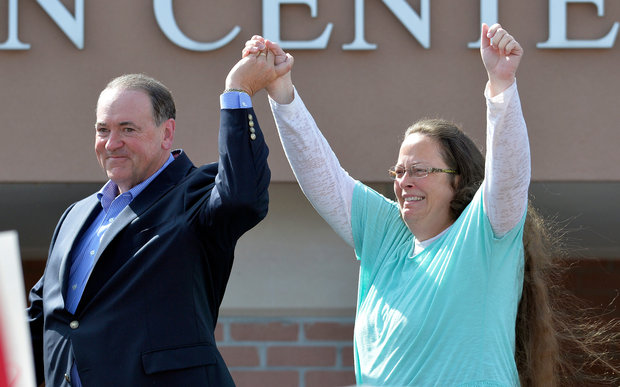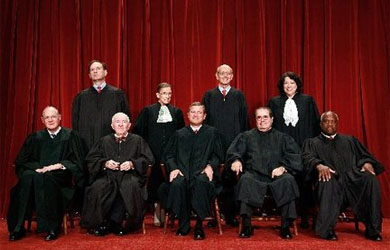When you have a Supreme Court nominee as well respected across the political and ideological spectrum as Merrick Garland, it’s no wonder that far right groups’ attacks against him make so little sense. Their “he hates the Second Amendment” attack last week was so illogical that it just made them look foolish. A new attack relating to religious liberty and the Affordable Care Act is equally baseless.
As with the Second Amendment example, the new attack is not based at all on any substantive ruling by Judge Merrick – not a written dissent, nor a majority opinion he authored or joined, nor a concurrence he penned. Instead, his critics are reading into his votes on whether certain three-panel decisions should be reconsidered by the entire D.C. Circuit in what is called an en banc review.
The first involved a D.C. Circuit panel decision called Priests For Life v. HHS, which is currently one of the many cases consolidated into Zubik v. Burwell, which will be argued before the Supreme Court later this week. The case concerns the ability of religiously affiliated nonprofits to opt out of the requirement to provide their employees certain contraception health insurance coverage without a co-pay. The law allows an accommodation so the employees can get the coverage without their employers having to contract, arrange, or pay for it. Instead, the employers simply tell the insurer or the federal government of their objection, at which point the insurer must offer the coverage separately to employees who want it. But some religious nonprofits assert that even this accommodation violates their religious liberty. A unanimous three-judge panel on the D.C. Circuit (which did not include Garland) upheld the law as not violating the Religious Freedom Restoration Act (RFRA). Hardly an outlier, the same legal conclusion has been reached by the 2nd Circuit, the 3rd Circuit, the 5th Circuit, the 6th Circuit, the 7th Circuit, the 10th Circuit, and the 11th Circuit. Last fall, the 8th Circuit reached the opposite conclusion, creating a circuit split that will be resolved by the Supreme Court.
In any event, Life Site News slams Judge Garland for voting against having the entire D.C. Circuit rehear the Priests for Life case. A vote for or against en banc review, absent an accompanying opinion, does not necessarily tell you anything about why the judge voted that way. In fact, several of the judges wrote or joined lengthy opinions explaining why they were for or against an en banc review. Chief Judge Garland joined none of them. Neither did George W. Bush nominee Thomas Griffith or Clinton nominee David Tatel, both of whom voted along with Chief Judge Garland not to rehear the case. The majority of the court voted against en banc review, so we don’t know how Garland would have voted on the merits of the case.
There could be any number of reasons not to want to review a panel decision; perhaps you agree with it; perhaps you think the issue is not important enough to merit that unusual step; perhaps you think a different case would be a better vehicle for addressing the legal issues; perhaps you’re concerned about the court’s workload; perhaps you know that numerous other circuits are addressing the exact same question and that — regardless of whether your court reconsiders the panel decision — the issue will be resolved by the Supreme Court, so that an en banc review would be a pointless waste of time and resources.
Indeed, that last scenario is what happened in the second ACA case that Life Site News attacks Judge Garland for. In that case, Halbig v. Burwell, a D.C. Circuit panel struck down the ACA’s subsidies structure in response to a legal attack widely recognized as purely politically motivated and legally weak (to be charitable) effort to destroy the ACA. In September 2014, the full D.C. Circuit voted without noted dissent to rehear the case, with no judge writing separately to explain their reasoning. The parties submitted detailed briefs and replies, in preparation for scheduled oral arguments in December. But then the Supreme Court accepted a case from the 4th Circuit raising the same issue, King v. Burwell, leading the D.C. Circuit to cancel its own planned oral arguments as a waste of time. So we don’t know how Chief Judge Garland would have voted on the merits of the case. (The conservative Roberts Court rejected the challenge in a 6-3 vote.)
Perhaps Chief Judge Garland, seeing how much effort went into an ultimately unnecessary en banc proceeding in the ACA subsidies case, didn’t want to repeat that scenario in the ACA contraception coverage case, knowing that the Supreme Court would likely be the ultimate arbiter of the legal issue.
The point is, we don’t know. We can’t know. Chief Judge Garland’s votes on whether to reconsider panel opinions simply don’t tell us anything about his views on the merits of the case, unless he writes or joins an opinion explaining his reasoning, which he did not do in these cases.







